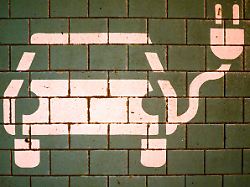updates
The development in graphics
Europe counts more e-cars
By Martin Morcinek
4/19/2023 3:24 p.m
In Europe, the expansion of electromobility is slowly gaining momentum: the European manufacturers’ association recorded a massive increase in new registrations in March. The combustion rate is falling, as the ACEA data show.
In Europe, the sales figures of car manufacturers are increasing significantly, and the proportion of e-cars is increasing. Within the European Union, significantly more newly registered passenger cars came onto the road last month than in March 2022. At 1.087 million, 28.8 percent more new cars were registered than in the same period last year, according to the manufacturer association ACEA. In all major sales markets, double-digit growth was recorded, it said.
The market share of exclusively battery-powered vehicles rose to 13.9 percent across Europe. Pure electric cars are apparently catching up massively at the moment: the number of new registrations across the EU rose by 58 percent in March to 151,573 e-cars.
A year ago, the market share of battery-powered cars was 11.4 percent. Cars with internal combustion engines had a market share of 37.5 percent in March.
According to ACEA data, the proportion of cars with diesel engines has more than halved in the past five years. In 2018, the diesel share in the European car market was still 36.7 percent: Five years ago, more than every third newly registered car was still fueled with diesel.
Since then, the conditions have changed fundamentally: new emission regulations, increased fuel prices and changed subsidies have pushed back the proportion of pure combustion engines. Within the EU, only every second newly registered car now runs exclusively on petrol or diesel. Five years ago, the proportion of combustion engines was 92.3 percent.
Almost a third of new registrations in the EU are cars with hybrid engines or plug-in hybrids. Alternative drive forms using natural gas or hydrogen engines have so far remained a niche in Europe.
There are significant differences from country to country in Europe when it comes to the expansion of zero-emission electromobility. The ACEA association, which brings together European car manufacturers, has by far the largest share of electric cars in Norway. There, the proportion of purely electric cars – i.e. without plug-in hybrids – has recently increased to 86.8 percent of all newly registered cars.
According to ACEA figures, the electricity quota in Germany is still 15.7 percent. Pure electric cars are less common in southern and eastern Europe. The association itself speaks of a connection between economic power and electric mobility and a north-south divide in Europe. In Greece, for example, the electrical share is currently only around 5.5 percent.
